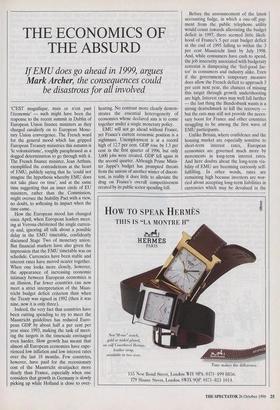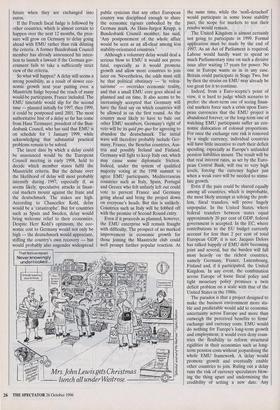THE ECONOMICS OF THE ABSURD
If EMU does go ahead in 1999, argues
Mark Archer, the consequences could
be disastrous for all involved
`C'EST magnifique, mais ce n'est past reconornie' — such might have been the response to the recent summit in Dublin of European Union finance ministers as they charged cavalierly on to European Mone- tary Union convergence. The French word for the general mood which has gripped European Treasury ministries this autumn is `le volontairisme', roughly paraphrased as a dogged determination to go through with it. The French finance minister, Jean Arthuis, exemplified the contradictions at the heart of EMU, publicly saying that he 'could not imagine the hypothesis whereby EMU does not take place on time', and at the same time suggesting that an inner circle of EU ministers, rather than the Commission, might oversee the Stability Pact with a view, no doubt, to softening its impact when the time came.
How the European mood has changed since April, when European leaders meet- ing at Verona christened the single curren- cy and, ignoring all talk about a possible delay in the EMU timetable, confidently discussed Stage Two of monetary union. But financial markets have also given the impression that the EMU timetable was on schedule. Currencies have been stable and interest rates have moved nearer together. When one looks more closely, however, the appearance of increasing economic intimacy between European economies is an illusion. Far fewer countries can now meet a strict interpretation of the Maas- tricht budget deficit criterion than when the Treaty was signed in 1992 (then it was nine, now it is only three).
Indeed, the very fact that countries have been cutting spending to try to meet the Maastricht guidelines has reduced Euro- pean GDP by about half a per cent per year since 1993, making the task of meet- ing the targets in the timescale envisaged even harder. Slow growth has meant that almost all European economies have expe- rienced low inflation and low interest rates over the last 18 months. Few countries, however, have paid for the recessionary cost of the Maastricht straitjacket more dearly than France, especially when one considers that growth in Germany is slowly picking up while Holland is close to over- heating. No contrast more clearly demon- strates the essential heterogeneity of economies whose declared aim is to come together under a single monetary policy.
EMU will not go ahead without France, yet France's current economic position is a nightmare. Unemployment is at a record high of 12.7 per cent. GDP rose by 1.3 per cent in the first quarter of 1996, but only 3,600 jobs were created. GDP fell again in the second quarter. Although Prime Minis- ter Juppe's budget has prompted threats from the unions of another winter of discon- tent, in reality it does little to alleviate the drag on France's overall competitiveness created by its public sector spending bill. Before the announcement of the latest accounting fudge, in which a one-off pay- ment from the public telephone utility would count towards alleviating the budget deficit in 1997, there seemed little likeli- hood of France's 5 per cent budget deficit at the end of 1995 falling to within the 3 per cent Maastricht limit by July 1998. And, while consumers have cash to spend, the job insecurity associated with budgetary restraint is dampening the 'feel-good fac- tor' in consumers and industry alike. Even if the government's temporary measure does allow the French deficit to approach 3 per cent next year, the chances of missing this target through growth undershooting are high. Interest rates may well fall further — the last thing the Bundesbank wants is a strong deutschmark to kill the recovery but the cuts may still not provide the neces- sary boost for France and other countries struggling to be among the first wave of EMU participants.
Unlike Britain, where confidence and the housing market are especially sensitive to short-term interest rates, European economies are governed much more by movements in long-term interest rates. And here doubts about the long-term via- bility of EMU are becoming curiously self- fulfilling. In other words, rates are remaining high because investors are wor- ried about accepting long-term liabilities in currencies which may be devalued in the future when they are exchanged into euros.
If the French fiscal fudge is followed by other countries, which is almost certain to happen over the next 12 months, the pres- sure will grow on Germany to delay going ahead with EMU rather than risk diluting the criteria. A former Bundesbank Council member has already announced his inten- tion to launch a lawsuit if the German gov- ernment fails to take a sufficiently strict view of the criteria.
So what will happen? A delay still seems a strong possibility, as a result of slower eco- nomic growth next year putting even a Maastricht fudge beyond the reach of many would-be participants, France included. The EMU timetable would slip for the second time — planned initially for 1997, then 1999, it could be postponed until 2001. The most authoritative hint of a delay so far has come from Hans Tietmayer, president of the Bun- desbank Council, who has said that EMU is on schedule for 1 January 1999, while acknowledging that substantial practical problems remain to be solved.
The latest date by which a delay could be announced would be the European Council meeting in early 1998, held to decide which member states fulfil the Maastricht criteria. But the debate over the likelihood of delay will most probably intensify during , 1997, especially if, as seems likely, speculative attacks in finan- cial markets mount against the franc and the deutschmark. The stakes are high. According to Chancellor Kohl, delay would be a 'catastrophe'. But for countries such as Spain and Sweden, delay would bring welcome relief to their economies. Despite Herr Kohl's optimism, the eco- nomic cost to Germany would not only be high — the deutschmark would appreciate, stifling the country's own recovery — but would probably also engender widespread public cynicism that any other European country was disciplined enough to share the economic rigours embodied by the German mark. As Hans-Jurgen Krupp, a Bundesbank Council member, has said, `Any postponement of the whole affair would be seen as an all-clear among less stability-orientated countries.'
Although a voluntary delay would deal a serious blow to EMU it would not prove fatal, especially as it would promote growth and allow more countries to join later on. Nevertheless, the odds must still be that political obstinacy — 'le volon- tairisme' — overrides economic reality, and that a small EMU core goes ahead as planned and on time. It also seems to be increasingly accepted that Germany will have the final say on which countries will be allowed in on the first round. As the country most likely to have to bale out other EMU members, Germany's right of veto will be its quid pro quo for agreeing to abandon the deutschmark. The initial wave will therefore probably include Ger- many, France, the Benelux countries, Aus- tria and possibly Ireland and Finland. Germany will fight to keep Italy out, which may cause some diplomatic friction. Indeed, under the system of qualified majority voting at the 1998 summit to agree EMU participants, Mediterranean countries such as Italy, Spain, Portugal and Greece who felt unfairly left out could vote to prevent France and Germany going ahead and bring the project down on everyone's heads. But this is unlikely. Countries such as Italy will be fobbed off with the promise of Second Round entry.
Even if it proceeds as planned, however, the EMU enterprise will remain fraught with difficulty. The prospect of no marked improvement in economic growth for those joining the Maastricht club could well prompt further popular reaction. At the same time, while the `senii-detached' would participate in some loose stability pact, the scope for markets to test their resolve would remain.
The United Kingdom is almost certainly not going to participate in 1999. Formal application must be made by the end of 1997. As an Act of Parliament is required, Labour would hardly want to spend so much Parliamentary time on such a divisive issue after waiting 17 years for power. No one in Europe wants us in in any case. Britain could participate in Stage Two, but by then the strains on EMU may already be too great for it to continue.
Indeed, from a Euro-sceptic's point of view, it is hard to judge which scenario to prefer: the short-term one of seeing finan- cial markets force such a crisis upon Euro- pean currencies that the EMU project is abandoned forever, or the long-term one of watching EMU participants suffer an eco- nomic dislocation of colossal proportions. For once the exchange rate risk is removed by a single currency, individual countries will have little incentive to curb their deficit spending, especially as Europe's unfunded pension liabilities mount. The result will be that real interest rates, as set by the Euro- pean Central Bank, will rise to very high levels, forcing the currency higher just when a weak euro will be needed to stimu- late growth.
Even if the pain could be shared equally among all countries, which is improbable, the most likely attempt at solving the prob- lem, fiscal transfers, will prove hugely unpopular. In the United States, where federal transfers between states equal approximately 20 per cent of GDP, federal government is accepted. In the EC, where contributions to the EU budget currently account for less than 2 per cent of total European GDP, it is not. Jacques Delors has talked happily of EMU debt becoming joint and several, but the burden will fall most heavily on the richest countries, namely Germany, France, Luxembourg, Finland and, if it participated, the United Kingdom. In any event, the combination across Europe of loose fiscal policy and tight monetary policy promises a twin deficit problem on a scale with that of the United States in the 1980s.
The paradox is that a project designed to make the business environment more sta- ble and predictable would add to economic uncertainty across Europe and more than outweigh the perceived benefits to firms' exchange and currency costs. EMU would do nothing for Europe's long-term growth and employment; it would even deny coun- tries the flexibility to reform structural rigidities in their economies such as long- term pension costs without jeopardising the whole EMU framework. A delay would promote growth and eventually enable other countries to join. Ruling out a delay runs the risk of currency speculators blow- ing the thing apart and undermining the credibility of setting a new date. Any
peripheral country that does sign up, such as Italy or Spain, will almost certainly have to devalue, with either a bang or a whim- per, within years of joining.
Albert Camus famously defined the Absurd in terms of Sisyphus repeatedly try- ing to push a boulder up a hill. It would not take an inspired cartoonist long to portray the boulder as EMU alongside a Sisyphean group of European central bankers and politicians lying exhausted beside it.
The author is director of Baring Asset Management.




















































































 Previous page
Previous page